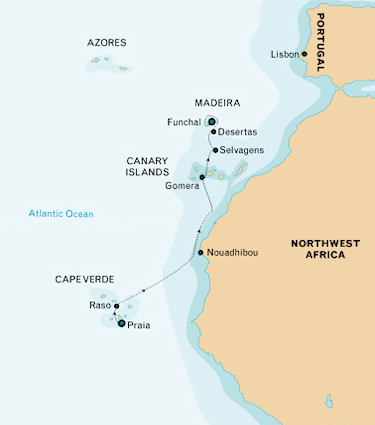Worldnature55
West African Pelagic
This voyage is in effect an extension of the Atlantic Odessey but may also be joined as a singel 8-days
journey. The ship (the recently converted Plancius) ia a very comfortable expedition cruse ship with
superb wildlife viewing is all directions and at alll deck levels.
There will be no landings, but If conditions permit there will be zodiac cruise around Raso/Selvages and
Desertas.

The islands Raso/Branco, located in the north-west of the Cape Verdes between the larger islands of
S o Nicolau and S o Vicente, are a marine-protected area. Raso is best know for the endangered Raso-lark.
When heading northeast, away from the Cape Verde Islands and towards the continental shelf off West Africa,
there will be plenty of seabirds to enjoy, plus and opportunities to look for dolphins, pilot whales and
perhaps some of the larger cetacean species.
Itinerary
- Day 1
- Day 2
- Day 3
- Day 4&5
- Day 6
- Day 7
- Day 8
- Day 9 (AM)
- Day 9 (PM)
- Boarding Praia (14:00)
- Cape Verde (Raso/Branco)
- At Sea
- Mauritania (shelf edge)
- At Sea
- Canary Islands
- Selvagens
- Desertas
- Disembarkment Funchal (12:00)
We reach the shelf in the morning near Nouadihbou and will spend two days cruising north along the shelf
edge off Mauritania and Western Sahara. Here we should expect the unexpected, for these rich waters are
rarely visited by naturalists. We hope that by chumming (a potent mix of fish scraps and oil) at key
points along our route we will enjoy close views of plenty of the commoner species plus, we hope, a few
surprises!
We will explore the deepwater channels around Gomera in the Canary Islands. A known hot spot for whales
and dolphins.
Reaching the remote Selvagens, we first see Selvagen Pequina and where we will spend an evening cruising
around Selvagen Grande.
In 1990 The Desertas became a Nature Reserve, comprising the islands themselves and the surrounding sea to
a depth of 100 metres. The southern half of Deserta Grande and Bugio are strictly forbidden to visitors even
by boat.
Trip Report
I did make this trip in may 2011, beeing the pioneering group, and we make all of our main targets.
As it was for me an extension off the Atlantic Odessey; i did some tourist-site-seeing-things in Praia in the
morning. Returning to the ship i got the Alexander's Swift.
The first half day at sea, just brought supprisingly species (White-tailed Tropicbird, Brown Booby's)
and a large group of Pantropical Spotted Dolphins
West African Pelagic
Though, it's not my main purpose to break a record, it give's a nice idea of the things I h've seen
So explore the list, to see nice picture's of different familie-goups; there are also detailed list
available of the different species.
There are also some pictures available of the When you want to know more about these islands, you have to visit my travelpages.
Arriving at Raso-island we did an early zodiac-cruise. The first glimse of the morning was an Osprey,
getting back to the island with an enourmous fish. There were also some Red-billed Tropicbirds, large
groups of Iago Sparrows and i did get my pictures of the Raso Lark.
The next day brings us the wanted Cetaceans (Atlantic Spotted Dolphins, Rough-toothed Dolphins and
very close to the boat a smal group of Killer Whale's.)
The days at the coast of Mauritania we encounterd the migration of the Sabine's Gulls, Red
Phalaropes and the Arctic Terns. There were also Royal Terns, Pomarine Jaegers and Long-tailed Jaegers.
There are enourmous factory-fishing-ships (mainly Russian, but also a couple of Dutch boats) active in
these waters. Hopefully (though i have my doubt's) the do have some respect for nature-enviroment.
At the Gomera-channel we had some great vieuws of a Bryde's Whale, Rough-toothed Dolphins and
some Short-finned Pilot Whales. Here i also get my firts real good foto-shot of the Portugese Man of War;
a jelly-like marine creature.
There was a large flock off Cory's Shearwater's around the Selvage's Islands and we did also see some
Hawksbill Turtle's.
Arriving at dawn near the Desertas-islands there was hope to see some off the Mediterranean Monk Seal's
But - doing a zodiac-tour around the islands - we were called bach to the ship, as this is a forbidden area.
As we arrived at Madeira there was a Roseate Tern in the harbour.
In had some time left after leaving the ship, so i did some site-seeing in Funchal. In the Botanical Garden
i found the Madeiran Speckled Wood and Madeiran Wall Lizard.

